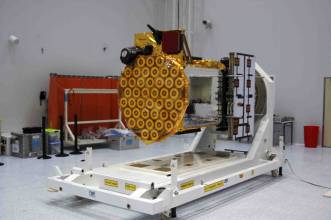
Iridium Satellite LLC (Iridium) and Boeing have achieved two major milestones to further develop and demonstrate capability enhancements to the High Integrity Global Positioning System (iGPS) program for the U.S. Naval Research Laboratory.
Iridium Satellite LLC (Iridium) and Boeing have achieved two major milestones to further develop and demonstrate capability enhancements to the High Integrity Global Positioning System (iGPS) program for the U.S. Naval Research Laboratory.
The first milestone, completion of an enhanced narrowband (ENB) software modification to computers on Iridium satellites, enables second-generation GPS-aiding signals to be broadcast through the entire Iridium constellation. According to Iridium, these broadcasts will enable rapid, more accurate GPS position fixes than are available with current technology.
The GPS-aiding signals will provide appropriately equipped military users substantially improved capabilities for quickly locking onto and tracking a GPS signal, even while operating in restrictive environments such as urban areas, forests, mountains and canyons, as well as under enemy jamming attempts or amid battlefield radio frequency noise.
“The completion of this on-orbit software enhancement to the Iridium constellation represents a significant step toward delivering aiding signals with embedded GPS data on demand on a global basis,” said David Whelan, Boeing Integrated Defense Systems chief scientist and vice president/deputy general manager, Boeing Phantom Works.
The second milestone was a demonstration of the acquisition of a GPS signal under substantial jamming while moving in a vehicle.
“When a military GPS receiver is jammed, it cannot obtain a position fix, and movement only makes the situation worse,” said Whelan. “Even from a cold start, it took only minutes for the High Integrity GPS-aided receiver, in a moving vehicle, to receive the GPS signal while being jammed. Without assistance from the High Integrity GPS system, a position fix would never have been obtained.”
The principle behind iGPS uses satellite signals from the Iridium low-earth orbiting (LEO) satellite communications system and GPS satellites. Iridium provides a high-power signal and rapidly changing ground track to accelerate an initial position fix by users. The GPS system provides navigational data in time, location and velocity.
The result is an augmentation to GPS that provides iGPS receivers with improved navigation, higher signal integrity, precision accuracy, and more jam-resistant capabilities. High Integrity GPS also has the potential to provide geographic positioning data to within centimeters, a vast improvement over current standalone GPS, which provides data within meters, according to the companies.
The team completed the ENB software upgrade on schedule and within budget and will support a system-level demonstration later this year. The iGPS team includes Iridium, Boeing Phantom Works’ Advanced Network and Space Systems, Rockwell Collins, Coherent Navigation, and experts from academia.
Funding for full development of the system, which has encountered opposition within both the Department of Defense and Congress, remains in doubt. The version of the 2010 DoD authorization bill passed by the House of Representatives on June 25 denies the President’s request of $59.1
million for the iGPS program.




